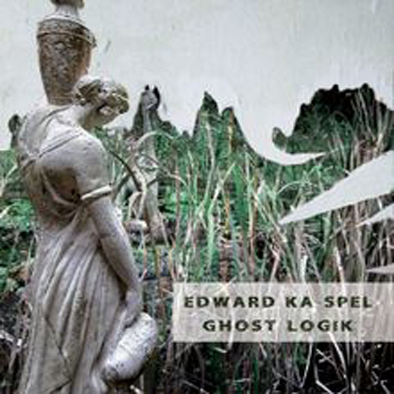 My opinion of Edward Ka-Spel has undergone a dramatic overhaul over the last few years, as the last several albums that I have heard have all floored me with at least one song (often more).  While he has been admirably devoted to making weird, uncompromising psychedelia for more than 30 years, he seems to be making some of the best and most disturbing music of his career right now (as evidenced here).  That is not to say that he has become dramatically less indulgent or difficult (unlikely to ever occur), but the high points of Ghost Logik are truly mesmerizing, haunting, and unique.
My opinion of Edward Ka-Spel has undergone a dramatic overhaul over the last few years, as the last several albums that I have heard have all floored me with at least one song (often more).  While he has been admirably devoted to making weird, uncompromising psychedelia for more than 30 years, he seems to be making some of the best and most disturbing music of his career right now (as evidenced here).  That is not to say that he has become dramatically less indulgent or difficult (unlikely to ever occur), but the high points of Ghost Logik are truly mesmerizing, haunting, and unique.
The more I listen to Ka-Spel's work, the more i seem to fall in love with his voice.  While it can certainly be shrill and maniacal-sounding sometimes (he has sounded like a crazed elf in the past), both his deep, resonant speaking voice and his lazily lilting singing voice can be enormously evocative and affecting.  The latter effect is most evident on Ghost Logik's most conventional song, "Throwing Things," where Ka-Spel makes otherwise mundane lyrics feel imbued with cryptic menace.
His vocals have an almost sing-song, nursery rhyme tone to them, which contrasts creepily and surreally with the shimmering and skittering melancholia of the music.  Of course, Ka-Spel is even more powerful when his words are as disturbing as his delivery, as they are on the album's highlight, "The Voyeur."  The accompanying music is little more than some minimal droning and crackling, but Edward's monologue is unwaveringly gripping and spine-chilling–except when it is darkly hilarious ("you...really...need..to..get...out...more.").
Most of the other songs occupy a similar "uneasy soundscape and spoken word" aesthetic territory, but the balance between storytelling and atmosphere varies quite a bit from piece to piece.  The disquieting tug-of-war between childlike simplicity and macabre sophistication persists in varying manifestations throughout the entire album, creating a unifying theme of sorts.  The feeling of entering someone else's already-unfolding nightmare is yet another (even stronger) theme.  In fact, that may be where Ka-Spel's true genius lies, as he is at his best when he drops into an enigmatic and vaguely sinister scenario, patiently and masterfully escalates the tension and dread, then ends it all with a darkly funny or ominously ambiguous turn of phrase.
It is remarkable that that "formula" works as often as it does, but Edward has a seemingly inexhaustible supply of such bizarre situations and unravels his tales with perfect timing and pacing.  No one else could make these songs work, as their success is irrevocably intertwined with the gravity of Ka-Spel's voice and his knack for pregnant pauses and hesitations.
The catch–there's always a catch–is that Edward's inexhaustible supply of dreamlike vignettes is not quite able to keep up with his prolific output.  Consequently, Ghost Logik is a somewhat insubstantial album (albeit very a cohesive one).  While "Throwing Things" and "The Voyeur" are both mesmerizing and perfectly realized, the remaining six songs are comparatively a mixed bag.  Two are only about a minute long, and several of the remaining four blunt their more inspired passages with some significant bloat.  They still definitely have their share of striking or chilling moments though, particularly "So What?" and "Brighton Line."  Also, they are surprisingly listenable, as only the 13-minute "Brighton Line" manages to grate on me with an extended jazz/quasi-beat poetry section.  It would be great if Edward could slow down long enough to make an entirely brilliant album rather than a partially brilliant one, but I am more than happy to settle for two amazing songs and a handful of very good soundscapes.
(Note- there are actually three versions of this album.  The "limited box" includes a second disc (Spectrescapes) featuring more abstract/longform ambient pieces, while the "deluxe limited box" also includes a third disc and a short film.)
Samples:
 
 
Read More


